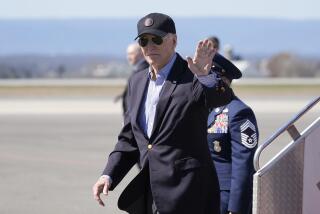Republican contenders compete for Christian conservatives
Competition for the hearts and votes of Christian conservatives is as wide open as the broader 2012 Republican contest, if a two-day gathering of political activists is any indication.
Virtually all of the Republican presidential contenders appeared before the Faith and Freedom Coalition conference in Washington, which ended Saturday. Each was warmly received by hundreds of delegates from across the country, though Minnesota Rep. Michele Bachmann generated the most enthusiastic response.
Social conservatives aren’t “any different from other primary voters. A huge number of them are just totally undecided,” said Ralph Reed, a longtime religious-right strategist who founded the sponsoring group, designed to bring evangelicals and “tea party” voters under the same tent.
Former Arkansas Gov. Mike Huckabee’s recent decision to pass up the 2012 campaign left a vacuum that remaining candidates are attempting to fill. Four years ago, Huckabee, a former Southern Baptist minister, won Iowa’s leadoff caucuses.
Bachmann, expected to announce her presidential intentions this month in Iowa, repeatedly brought the crowd out of its chairs with a blend of red-meat rhetoric and autobiographical detail. She attacked Planned Parenthood as a “corrupt organization,” swore a tireless commitment to repeal of “Obamacare,” deplored what she claimed was Obama’s “shocking” betrayal of Israel, and finished up, eyes closed, with a two-minute prayer.
Also addressing the audience were former Massachusetts Gov. Mitt Romney, who described the federal debt as a “moral tragedy,” and former U.S. ambassador to China Jon Huntsman, who touted his record as an abortion foe and tax cutter while governor of Utah. Both are Mormons, which, according to a recent Pew Center opinion survey, puts them at a disadvantage in seeking support from white evangelical Protestants.
Huntsman, a day after leaving the event, said he planned to skip Iowa’s caucuses, where evangelical Christians cast as much as 60% of the vote. Romney has not committed to competing aggressively there either. That apparent skittishness led a prominent social conservative to question the sincerity of their appeals for evangelical support.
“The bottom line is, if they come to this conference and play to this crowd and say the things they want us to hear, but they won’t come to Iowa, that’s a double standard,” said Steve Scheffler, who heads the Iowa affiliate of Reed’s organization and also is the state’s Republican national committeeman.
Huntsman couched his Iowa decision in terms of his opposition to federal subsidies for agriculture and ethanol. But a rival GOP candidate, Tim Pawlenty, who has already come out against continued ethanol subsidies, is counting heavily on Iowa to propel him into contention.
Pawlenty, a former Minnesota governor, drew applause at the Faith and Freedom event Friday night when he said Republicans must have the courage to tell voters the truth, even if it comes with risk.
“And so, when I started my campaign, I went to the all-important state of Iowa and said, even for people in Iowa, there are some real truths we’re going to have to tell. That means we’re going to have to phase out the ethanol subsidies,” Pawlenty, an evangelical Christian, said to applause from the crowd.
Pawlenty “probably impressed me the most,” said Kit Burns, 59, an architect from Seattle. But he said it was still too early for him to back a candidate.
Miriam Corbin, 60, a municipal employee in Atlanta, would be backing Huckabee if he were in the race. Instead, she’s leaning toward Bachmann.
“She’s smart. She’s savvy,” Corbin said. “She’s run a business, raised children and she has strong religious convictions. I think that’s important in our next leader.”
Republican hopes for retaking the White House have brightened as a sputtering economic recovery and rising unemployment threaten Obama’s reelection chances. But activists attending the conference were warned repeatedly about the dangers of getting bogged down in fights over ideological purity, which could fragment the conservative opposition.
“In politics, purity is the enemy of victory,” said Mississippi Gov. Haley Barbour, a former Republican national chairman. “We can’t start out with the idea, as the Faith and Freedom Coalition, that our candidate’s got to agree with me on every single thing. We cannot expect our candidate to be pure. Winning is about unity.”
Barbour said afterward, in response to reporters’ questions, that he wasn’t referring to Romney, the nominal front-runner whose past support for gay rights and abortion rights is a nonstarter for some conservatives.
Reed said he wasn’t overly concerned that tea partyers and evangelicals would balk at supporting a nominee they considered insufficiently conservative, because of their desire to defeat Obama.
He did say the GOP would be in trouble if it did not find a way to make inroads among younger voters, women, Latinos, African Americans, Asians and other minorities. To win in the future, Republicans must practice “the politics of addition, not subtraction, and grow the pie,” Reed said.
Times staff writer Seema Mehta in North Conway, N.H., contributed to this report.
More to Read
Start your day right
Sign up for Essential California for news, features and recommendations from the L.A. Times and beyond in your inbox six days a week.
You may occasionally receive promotional content from the Los Angeles Times.






